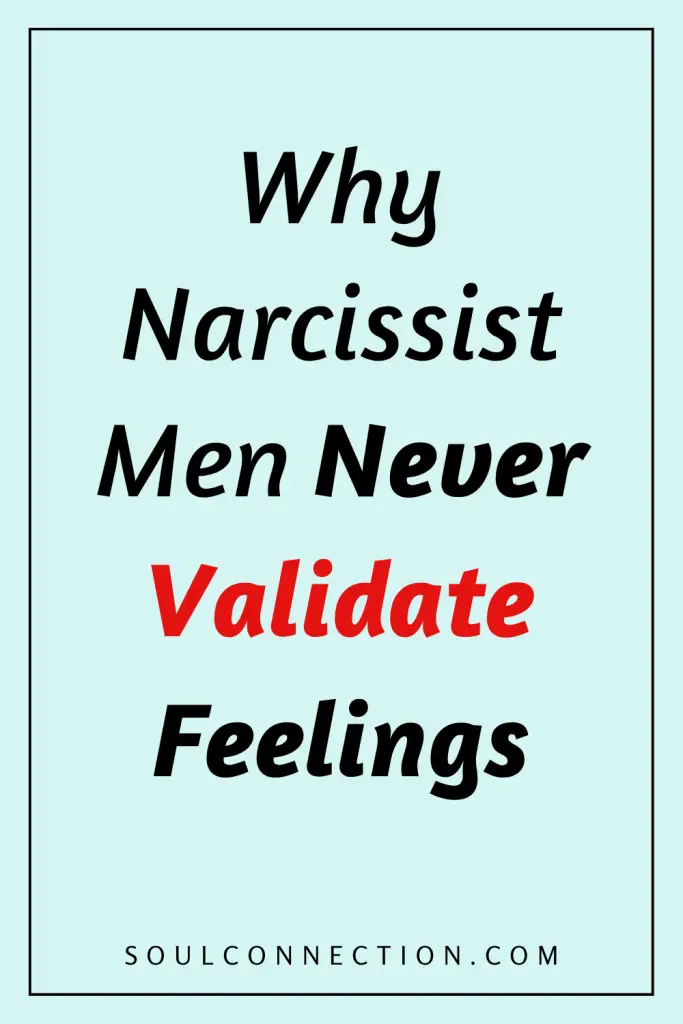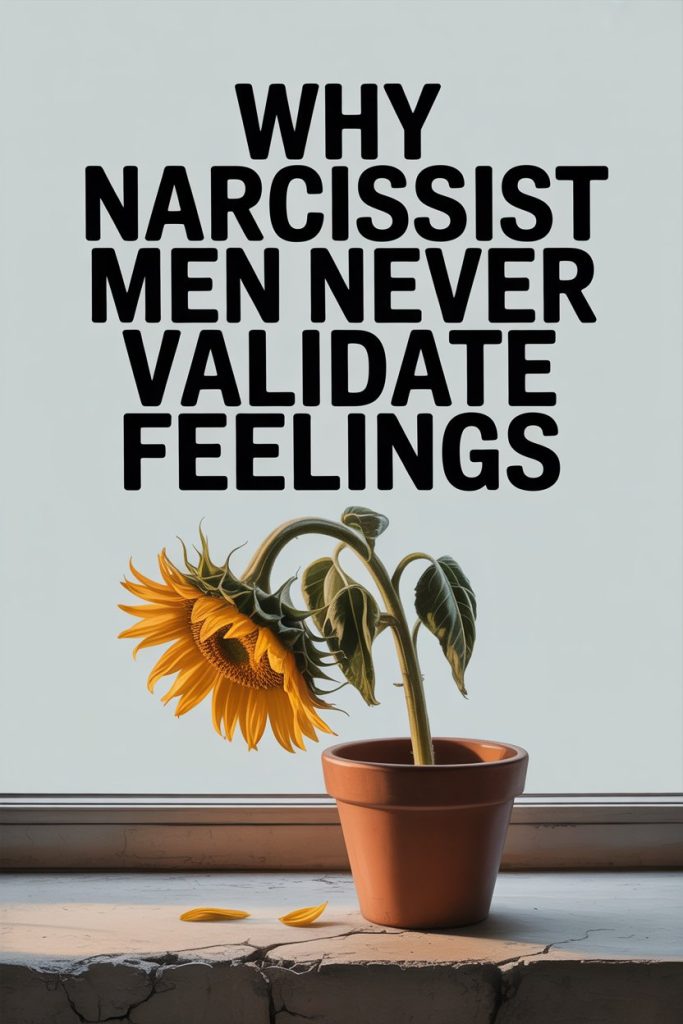Ever found yourself pouring your heart out to a man who treats your vulnerability like an annoying pop-up ad? You’re not alone.
When it comes to emotional validation, narcissist men are as reliable as a chocolate teapot. There’s a reason for this emotional drought, and no, it’s not just that they missed a few empathy lessons at school.
Digging into why narcissist men never validate feelings can feel like peeling an onion — lots of layers, and it might make you want to cry.
But if you’ve ever wondered why your needs seem to bounce off your partner like tennis balls off a brick wall, you’re in the right place.
The Emotional Black Hole
Narcissist men treat empathy like a foreign language that only comes with Google Translate — and even that’s glitchy. They crave attention and admiration, but struggle to offer the same in return.
When you share your feelings, what you’re really asking for is acknowledgment: “Yes, I see you. Yes, your feelings make sense.” With a narcissist, you might as well be speaking Morse code.
Emotional validation threatens their fragile sense of superiority. If your feelings are real, then maybe their needs aren’t the only ones that matter — and that’s a tough pill for them to swallow.
You’re left feeling invisible, or worse, dramatic. It’s not you. It’s basic wiring.
Their Self-Esteem Balancing Act
Narcissist men build their self-esteem like a Jenga tower out of other people’s admiration. Take away the constant praise and the whole thing wobbles dangerously.
Validating your feelings requires shifting their focus away from themselves, and that’s about as comfortable for them as wearing socks full of sand.
When you’re upset, their internal monologue isn’t “How can I help?” but “How does this affect me?” Your distress might even feel like a personal attack to them, triggering defensiveness instead of support.
And if admitting your feelings are valid means admitting they’ve done something wrong? Well, that’s simply not written into their script.
The Control Playbook
For narcissist men, control is everything. Emotional validation levels the playing field, reminding both partners that everyone’s needs matter.
That’s threatening for someone who wants to stay at the top of the relationship food chain.
Dismissal, minimization, and gaslighting aren’t just accidental — they’re tools. When your feelings get invalidated (“You’re too sensitive,” “You always make a big deal out of nothing”), it’s much easier for them to maintain their position of power.
The more you doubt yourself, the more control they keep.
It’s not about communication skills; it’s about keeping the upper hand.
Why Apologies Are Rare Sightings
Ever waited for a heartfelt apology from a narcissist and realized you’d grow old first?
Validating your feelings after a disagreement often goes hand-in-hand with admitting fault. But to the narcissist, being wrong feels like a crack in their armor.
An apology suggests their actions have consequences. And your pain? That means they’re not perfect.
The idea is so intolerable that it’s easier for them to deny your feelings altogether than face any personal shortcomings.
If you do get an apology, it’s usually the “Sorry you feel that way” variety — a masterclass in non-apology.
Emotional Intimacy on Their Terms
Narcissist men yearn for connection, but only on terms that guarantee they stay admired. Real intimacy requires both partners to feel seen and heard. That’s risky business for someone who equates vulnerability with weakness.
Opening up to your partner should invite empathy, but with a narcissist, it can feel like submitting to an emotional TSA pat-down.
Vulnerability from you highlights their own lack, so they shut it down with a quick deflection, criticism, or a sudden need to check their email.
The result? Conversations that leave you feeling lonelier than before you started.
Childhood Roots and the Empathy Gap
Many narcissists didn’t just pop out of the womb with a selfie stick and a fragile ego. Early experiences, like inconsistent parenting or emotional neglect, shape how they see themselves and others.
Validating feelings isn’t just hard — it might actually feel unsafe to them.
Empathy requires recognizing someone else’s emotional experience. But when you’re raised to believe your own feelings are the only ones that matter — or that emotions are dangerous — it’s tough to pivot as an adult.
Understanding these roots isn’t about excusing the behavior. It’s about seeing the whole iceberg, not just the tip.
The Never-Ending Spotlight
Narcissist men treat relationships like a stage — and they’re always angling for the lead role. Validating your feelings would mean shifting the spotlight, even for a moment. For them, that’s like pulling teeth with a rusty spoon.
When you express hurt or sadness, they might dismiss, deflect, or even hijack the conversation to bring the attention back to themselves. (“You think you had a bad day? Wait until you hear what happened to me!”)
It’s not just garden-variety selfishness — it’s survival, in their eyes.
You quickly learn to keep your feelings to yourself, just to avoid becoming an unwitting extra in their one-man show.
Gaslighting in All Its Glory
Ever left an argument more confused than when you started? That’s not an accident. Narcissist men are masters at muddying the emotional waters, often using gaslighting to keep you off-balance and doubting your reality.
When you express a need, you’re met with: “That never happened,” or “You’re overreacting.” The goal isn’t just to win the argument — it’s to rewrite the script so your feelings never even entered the scene.
This isn’t about a genuine difference in perception. It’s about rewriting your story in a way that keeps their ego unscathed.
How to Reclaim Your Emotional Reality
Living with emotional invalidation can do a number on your self-worth. But here’s some good news: you can take steps tonight that start to change the pattern.
- Trust your gut. If you feel hurt or overlooked, your experience is real — even if he can’t or won’t acknowledge it.
- Set boundaries. Decide what kind of treatment you’ll accept. Expressing your needs isn’t being “too sensitive”; it’s being human.
- Seek connection elsewhere. Healthy support can come from friends, family, or a therapist. You deserve validation (and a bit of peace and quiet).
- Limit emotional exposure. If your attempts to connect are met with more dismissal, it’s OK to stop banging your head against that particular wall.
- Consider your options. A relationship with a narcissist doesn’t have to last forever. Your happiness isn’t dependent on his ability to change.
Not every narcissist is created equal, and not every relationship has to end in a hail of slammed doors. But if you find yourself longing for a crumb of empathy, it might be time to ask: What am I hoping for, and what am I actually getting?
Finding Your Voice Again
Emotional validation isn’t too much to ask for. It’s the bare minimum, like turning up to a dinner party with actual food. If your partner doesn’t get it (or refuses to learn), that’s not your shortcoming.
Narcissist men rarely validate feelings because doing so threatens the foundation of their self-image. They live in a world where only their emotional weather matters. You don’t have to get soaked in their storm.
Keep your sense of humor and your standards high. You deserve acknowledgment, not a permanent seat in the audience of someone else’s drama.
And if you feel like no one’s told you lately: your feelings are real, and they matter. Even if he can’t see it, you can.


